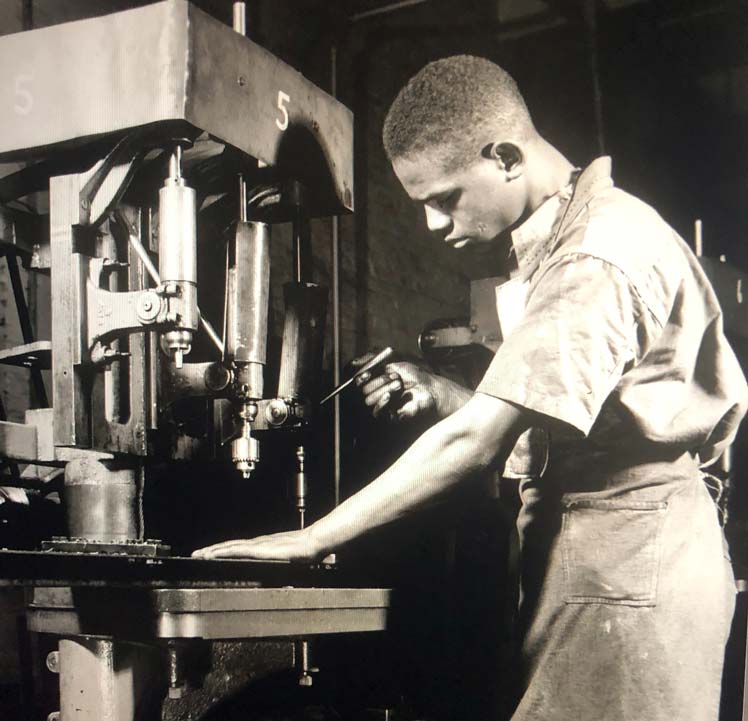by John Gardner
American immigration policies in the late 1800’s such as the Immigration Act of 1882 and the Alien Contract Labor law prohibited certain laborers from coming to America, specifically blocking the entry of “idiots, lunatics, convicts, and persons likely to become a public charge.” more
These were followed by even more immigration laws in 1921 and 1924. more
Per United States government census data these strong immigration laws “brought about a shortage of labor in many industrial and manufacturing centers in the Northeast and Midwest” thus creating job opportunities for those already on American soil. more
In American history The Great Migration refers to the internal migration of African Americans from the Jim Crow South to the industrialized cities of the North such as Chicago, New York, Detroit, Baltimore, Philadelphia, Cleveland and Pittsburgh. This occurred over decades, starting around 1910 and continuing to the 1970’s with a significant reason for this exodus being the allure of jobs in the Manufacturing sector.
While cities such as Cincinnati, home of Uncle Tom’s author Harriet Beecher Stowe, and Pittsburgh, where escaped slaves washed their clothes in the three rivers that form what is now Point State Park, may have already had larger African American populations as they were Underground Railroad hubs in the Free North, the main factor contributing to the concentration of African American populous in the industrial mecca’s of yesterday is without a doubt the manufacturing industry. more
“If it wasn’t for the factory, the average black would not have been able to survive all of these years, especially without any education. There was always so much talk down South about the manufacturing jobs up here and how easy you could get a job,” said Ms. Perkins, whose siblings and other relatives work in the auto industry. “People were excited about the pay, and after they’d get a job they would help their families back in the South. They would all the time drive their new cars down and show them off.“ -Claudia Perkins 33 years in Automobile Industry more
In spite of facing the Medusa of racism the early pioneers of the Great Migration found the path of opportunity that is the American Dream and to them the manufacturing industry represented the hope of employment and the opportunity to provide a better future for their children.
Those with a negative view of life in America may categorize the early desegregation of the manufacturing industry as “just for the convenience of workplace logistics” or the quick placation of a cheap labor force but the facts point to the general embracement of black communities and the foundation being set for the Civil Rights movement that culminated in the mid-1960’s.
This foundation was composed of the strong family units and close-knit communities the manufacturing industry enabled by providing good jobs. Job opportunities that were there and are now gone because corporations have off-shored production in search of cheap labor overseas due to the untenable situation created by labor unions.
See graph confirming the zenith of Baltimore’s manufacturing sector and aligning directly with the growing Civil Rights movement

Much fodder for future articles, but I digress from the specific subject of this article which is the desegregation of factories.
Nearly 25 years before the Civil Rights Act of 1964 “discriminatory employment practices by federal agencies, all unions, and all companies engaged in war-related work”, i.e. the industrial base, was prohibited when President Franklin D. Roosevelt signed Executive Order 8802. Furthermore, the “Fair Employment Practices Commission was created to enforce this new policy”. more
It is commonly agreed that this “established the foundation for Title VII of the 1964 Civil Rights Act and Executive Order 11246 in 1965”. more
The manufacturing Industry Led in the fight for Civil Rights even further back than 1941 when; “-in 1919 Ford Motor Company became one of the first major companies to employ black workers in non-menial jobs. Henry Ford’s willingness to breach the color line opened a new economic frontier for African Americans and in doing so, Ford developed a reputation as a trailblazer in the world of industrial relations.” more
“Many of Ford’s Black employees worked as janitors and cleaners or in the dirty and dangerous blast furnaces and foundries at the growing River Rouge Plant. But some were employed as skilled machinists or factory foremen, or in white-collar positions. Ford paid equal wages for equal work, with blacks and whites earning the same pay in the same posts. Throughout the 1920s and 1930s Ford Motor Company was the largest employer of Black workers in the city, due in part to Henry Ford’s personal relationships with leading Black ministers. Church leaders in the Black community helped secure employment for hundreds and possibly thousands, but more importantly, they also helped to mediate conflicts between white and Black workers.” more
Ford’s relationship with the black community soured when union ideology took root opposing Fords belief that, “ -jobs were more important than charity”.
Henry Ford’s actions contributed greatly to the Civil Rights movement and these facts are beautifully documented in the book, “The Making of Black Detroit in the Age of Henry Ford” by Beth Tompkins Bates. more
In conclusion, how did the manufacturing industry support and allow the Civil Rights Movement to grow? My opinion is that is created opportunity in the form of jobs.
Jobs create stability and give hope. Stability to protest in peace. Hope that you can protest and still go home to feed your children and rise to work the next day.
Jobs. Jobs. Jobs…”jobs are more important than charity”.
